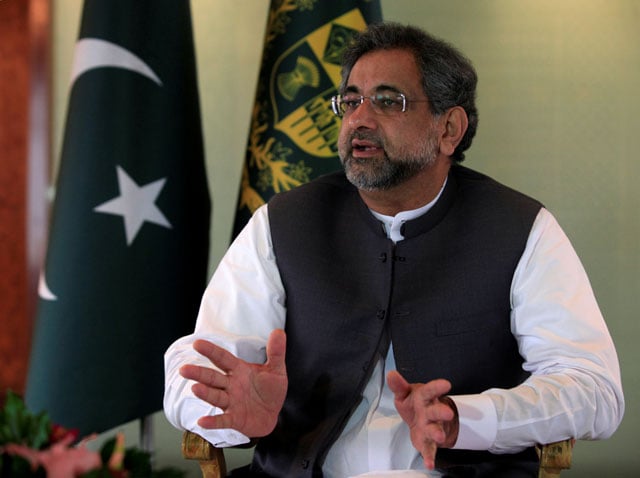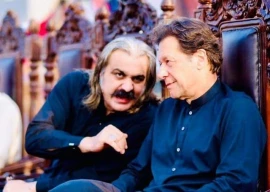
US-Pakistan relations have frayed since President Donald Trump last month set out a new Afghanistan policy and lashed out at Islamabad, accusing it of giving ‘safe haven to agents of chaos’ by harbouring the Afghan Taliban and other militants.
The United States has already begun conditioning future aid to Pakistan on progress Islamabad makes in tackling the Haqqani Network militants, who, it alleges, are Pakistan-based and have helped the Taliban carry out deadly attacks inside Afghanistan.
War on terror aid: Pakistan received $33.4bn from US
Pakistan denies hosting militant sanctuaries, and Islamabad bristles at claims it has not done enough to tackle militancy, noting the country has borne the brunt of violence in the war against terrorism, suffering tens of thousands of casualties since 2001.
Abbasi, 58, told Reuters that any targeted sanctions by Washington against Pakistani military and intelligence officials would not help US counter-terrorism efforts. “We are fighting the war against terror, anything that degrades our effort will only hurt the US effort,” he said in an interview in Islamabad on Monday. “What does it achieve?”
US officials privately say the targeted sanctions would be aimed at Pakistani officials with ties to extremist groups and are part of an array of options being discussed to pressure Pakistan to change its behaviour, including further aid cuts.
Fighting terror: NAP implementation slips off govt radar
Washington’s civilian and military assistance to Pakistan was less than $1 billion in 2016, down from a peak of $3.5 billion in 2011, and Abbasi warned that the US will not achieve its counter-terrorism aims by starving Pakistan of funds. “If the military aid cuts degrade our effort to fight war on terror, who does it help?” he said. “Whatever needs to be done here, it needs to be a cooperative effort.”
Abbasi said one practical side-effect of military aid cuts and the US Congress blocking the sale of subsidised F-16 fighter jets to Pakistan will be to force Islamabad to buy weapons from China and Russia. “We’ve had to look at other options to maintain our national defensive forces,” he said.
The Trump administration’s tougher stance is seen as pushing Islamabad closer to Beijing, which has pledged about $60 billion in roads, rail and power infrastructure in Pakistan as part of its ambitious Belt and Road initiative to build vast land and sea trade routes linking Asia with Europe and Africa. “We have a major economic relationship with (China), we have a major military relationship since the 1960s, so that’s definitely one of our options,” Abbasi said.
Sixteen years after 9/11, ever-vigilant New Yorkers on edge
The prime minister said it was “unfair” to blame Pakistan for all the troubles in Afghanistan, stressing that Washington should show more appreciation for Pakistan’s losses from militancy and its role in hosting 3.5 million Afghan refugees.
He added that Afghan-based militants have also launched cross-border attacks on Pakistani civilians and military, prompting Islamabad to begin investing ‘several billion dollars’ to fence the porous 2,500 km border. “We intend to fence the whole border to control that situation,” he added.
Abbasi also faces growing headwinds on the economy ahead of the general election, likely in mid-2018. Growth in Pakistan’s $300 billion economy surged to 5.3 per cent in 2016-17, its fastest pace in a decade, but the macroeconomic outlook has deteriorated, stoking concerns Pakistan may need an International Monetary Fund (IMF) bailout to avert a balance of payments crisis. Pakistan’s foreign exchange reserves have dwindled by almost a quarter to $14.7 billion since last October, while the 2016-17 current account deficit has more than doubled to $12.1 billion.
Anti-terror chiefs want social media help with 'lone wolves'
Abbasi said the government was looking at a raft of measures to alleviate current account pressures to avoid going back to the IMF, including reducing imports of luxury goods, boosting exports, and possibly devaluing its currency.
Finance Minister Ishaq Dar is a staunch opponent of a weaker rupee but the Prime Minister said it had been discussed. “There are pros and cons to devaluation, but that could be a decision we take,” he said, adding that any devaluation would not be drastic, and “today, it’s not on the table yet.”
Abbasi is also pushing ahead with a wide-ranging tax reform agenda before the elections. The ruling PML-N is looking for cross-party support for the reforms, but Abbasi said radical changes would require an integrated approach, including building confidence among tax payers, reducing income taxes and making it less attractive to invest in a real estate sector that attracts black money. “You not only need to have a stick, you need to have a carrot also.”
Abbasi, who has hinted his former boss, Nawaz Sharif, remains the power behind the throne by repeatedly calling him ‘the people’s prime minister’, said the three-time premier remains hugely popular despite his disqualification by the Supreme Court on July 28. “Politics is not decided in courts,” said Abbasi, who was jailed along with Sharif after the 1999 military coup. “Politically, Nawaz Sharif is stronger today than he was on July 28.”

















COMMENTS (5)
Comments are moderated and generally will be posted if they are on-topic and not abusive.
For more information, please see our Comments FAQ